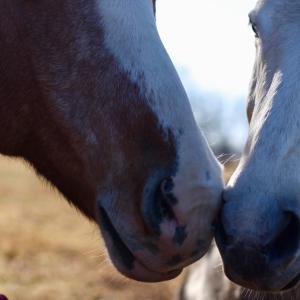
by Vet Emma Trott

The two most common vaccinations that horses, ponies and donkeys are vaccinated against in the UK are Equine Influenza (flu) and Tetanus.
In the UK horses can also be vaccinated against Equine Herpes Virus (EHV) and strangles.
Equine Influenza is a highly infectious viral respiratory disease that spreads easily among susceptible animals. The virus can spread through the air, through nose-to-nose contact or through infected material on equipment.
Horses with equine influenza might show signs of; a temperature, a dry harsh hacking cough, lethargy, inappetence or nasal discharge. These signs are also present in many other diseases so if your horse is presenting with any of these signs, we would advise that they are examined by a vet. We can then help to recommend appropriate testing, management and treatment advice.
To help reduce the risk of disease in our horses we recommend that all horses are vaccinated against equine influenza from 6 months of age. Horses require an initial course of three vaccinations and then either yearly or 6 monthly boosters depending on the horse’s risk.
Each competition body has differing rules on vaccination requirements so please contact any venue or competition body for accurate information on vaccination intervals. Because flu can be spread through the air we would advise that retired horses and those that do not leave a premises may still be at risk of catching flu.
Tetanus is a life-threatening disease which even with intensive treatment has poor survival rates. It is caused by the bacteria Clostridium Tetani whose spores live for long periods in the soil and then contaminate open wounds. The bacterium has an incubation period of 7-21 days, therefore often the wound may have healed prior to the horse showing symptoms of tetanus.
Tetanus can affect any horse regardless of age. Vaccination for tetanus is very effective, and we strongly advise that all horses are vaccinated for tetanus whether they leave the premises or mix with other horses. This vaccine can be combined with your horse’s influenza vaccination or given separately. We would also advise in-foal mares receive a booster in their last month of pregnancy to help protect their foals.
If your horse is not vaccinated, then we would advise that they receive an injection of tetanus antitoxin after wounds to reduce their risk.
There are five different types of equine herpesvirus that affect horses. EHV1 and EHV4 are most commonly seen and can cause respiratory infections, abortion in pregnant mares and in rare cases severe neurological disease.
To reduce the risk of abortion, pregnant mares are advised to be vaccinated at 5, 7 and 9 months of gestation and it is advised that competition horses receive EHV as part of their annual vaccinations.
We are now also able to vaccinate against Strangles (Streptococcus Equi Equi). Strangles is a bacterial infection that is passed by direct contact with infected material.
Vaccination with Strangvac can help reduce clinical symptoms of strangles. These include inappetence, nasal discharge, swollen lymph nodes, high temperature, coughing and difficulties breathing.
The vaccination can also help reduce the number of lymph node abscesses and can be used in an outbreak situation to help protect your horses. We advise that horses receive a primary course of injections, which includes giving two injections four weeks apart and then subsequent boosters depending on your horse’s risk.
If you have any questions regarding your horse’s vaccinations then please contact your vets.